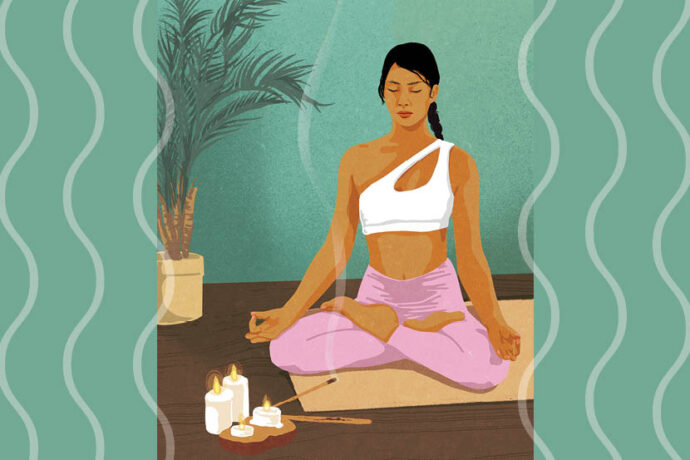
Psychodermatology, a relatively new discipline, is showing there are benefits to be gained from treating skin problems with psychological techniques, either alone or alongside physical therapies
You’re preparing for a big event – an interview for a new job, perhaps, or a speech you’re going to make. The only thing is, you get nervous about public speaking. When the big day arrives, you wake up to discover an angry-looking pimple, right in the middle of your forehead. Why does your body do this, just when you want to feel your best?
It’s easy to appreciate that your skin and emotions are linked – your skin is your biggest organ, after all. Like a huge sensor packed with nerves, it keeps the brain in touch with the outside world, and often reflects a person’s inner feelings. Someone feels embarrassed, and they may flush red, anxiety can translate into a patch of dry skin. In fact, it’s been estimated that up to a third of psychological factors (such as stress and negative emotions) can affect skin disorders.
Psychological link
An occasional spot might be irritating, but what if you have to cope with a chronic skin issue – be it psoriasis, eczema or dermatitis, for example – for months or years on end? What if the itching and scratching becomes so bad that it interferes with your peace of mind and your sleep? Living with adverse skin conditions, and people’s reactions to them, can truly take its toll on the psyche. These days, however, there is a discipline that those affected can turn to. Psychodermatology, or the treatment of skin disease using psychological support, has gained much credence in recent years in the area of psychosomatic medicine (where a physical illness or other condition is caused or aggravated by mental factors, such as internal conflict or stress).
Dr Linda Papadopoulos, a psychologist and psychodermatologist, says skin conditions affect people of all ages: ‘We do know now that the skin and psyche are deeply linked, and a person’s skin issues can be worsened by their mental state,’ she says. ‘When we are stressed, levels of hormones, such as cortisol and testosterone, increase, as does sebum, which can cause blockages in the pores – which can result in you getting that pimple. We are affected [mentally] as our skin is such an integral part of who we are. It’s so tied up with our self-image, ever more so in this Instagram age.’
Linda points to studies of people with eczema who kept a diary and noted they experienced flare-ups of the condition during periods of stress: ‘And while the way we feel affects our skin, it’s also true that the appearance of our skin affects how we feel – so it can be a vicious circle.’
People have also reported that the stress they experience as a result of their skin condition is exacerbated by others’ reactions to how they look. ‘They say people stare and make rude comments – reactions such as these can crush someone’s confidence,’ says Linda. ‘Even so-called kind comments, such as “It’s not going to kill you”, can badly affect how someone feels.’
For patients with acne, for example, Linda says: ‘We now understand that treating the acne alone isn’t enough. It’s the psychological factors and behaviours that we need to treat, too.’ And as well as feelings, there are often compulsive behaviours to address, such as constantly checking the skin in mirrors or touching affected areas. ‘Your skin becomes like a Rorschach test for how you’re feeling,’ says Linda.
Long history
Psychodermatology may be a relatively recent discipline, but ideas around it have been documented for centuries. Hippocrates (460–377 BCE) wrote of the relationship between stress and its effects on skin, citing cases of people who tore their hair out because of emotional stress. In 1857, dermatologist and surgeon Sir William James Erasmus Wilson, author of many publications on diseases of the skin, described the first so-called “skin neurosis” and covered topics such as delusions of parasitosis (a rare disorder in which patients believe they have parasites).
Modern alternatives
Thankfully, treatments for skin conditions such as psoriasis have improved, as has the availability of psychological support. The Skin Health Institute offers information on support groups and services available for those affected by various dermatological conditions.
According to Linda, helping people cope with the stress of the skin’s appearance and the reactions of others needs specific strategies: ‘We developed a cognitive behavioural therapy [CBT] protocol to help people with the psychological aspects of these conditions.’ In fact, in a series of studies with more than 900 participants, researchers noted that psychological therapies aimed at reversing habits had the biggest effect – particularly those that help patients to modify their behaviour to deal with itching and scratching.
Research has shown that as well as CBT, relaxation sessions and meditation are helpful to people with psoriasis, eczema, acne and vitiligo – a condition in which the pigment is lost from areas of the skin. As Linda says: ‘The fact that we’re acknowledging skin issues can be more than skin deep – and awareness of that is spreading – is so important.’
If you have any concerns or worries about a skin condition, see your GP or healthcare professional. They may be able to refer you to a psychodermatologist, or related specialist, who can offer support and therapy, with treatment tailored to your individual needs.



















